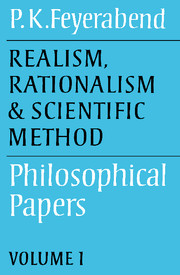Book contents
- Frontmatter
- Contents
- Introduction to volumes 1 and 2
- PART I ON THE INTERPRETATION OF SCIENTIFIC THEORIES
- 1 Introduction: scientific realism and philosophical realism
- 2 An attempt at a realistic interpretation of experience
- 3 On the interpretation of scientific theories
- 4 Explanation, reduction and empiricism
- 5 On the ‘meaning’ of scientific terms
- 6 Reply to criticism
- 7 Science without experience
- PART 2 APPLICATIONS AND CRITICISMS
- Sources
- Name index
- Subject index
2 - An attempt at a realistic interpretation of experience
Published online by Cambridge University Press: 05 June 2012
- Frontmatter
- Contents
- Introduction to volumes 1 and 2
- PART I ON THE INTERPRETATION OF SCIENTIFIC THEORIES
- 1 Introduction: scientific realism and philosophical realism
- 2 An attempt at a realistic interpretation of experience
- 3 On the interpretation of scientific theories
- 4 Explanation, reduction and empiricism
- 5 On the ‘meaning’ of scientific terms
- 6 Reply to criticism
- 7 Science without experience
- PART 2 APPLICATIONS AND CRITICISMS
- Sources
- Name index
- Subject index
Summary
INTRODUCTION
‘The task of science’, writes Niels Bohr, ‘is both to extend the range of our experience and to reduce it to order.’ ‘Science’, echoes a modern philosopher, ‘is ultimately intended to systematize the data of our experience.’ In the following paper I shall try to show that these two statements, in spite of their simplicity and their apparently innocuous character, have consequences which are at variance with scientific method and reasonable philosophy.
For convenience I shall call any interpretation of science (and of theoretical knowledge in general), which implies an assumption equivalent to the two statements quoted above, a positivistic interpretation. Examples of positivistic interpretations in this sense are (1) instrumentalism, i.e. the view that scientific theories are instruments of prediction which do not possess any descriptive meaning; and (2) the more sophisticated view that scientific theories do possess meaning, but that their meaning is due to the connection with experience only.
I shall proceed in the following way. After a few preliminary remarks on the notion of observability I shall develop some consequences of positivism. These consequences will be expressed in the form of a thesis (stability thesis, section 3). It will be shown that there exist serious objections against the stability thesis as well as against the customary attempts to defend it (sections 4 and 5). An alternative thesis will be considered and its consequences developed (section 6).
- Type
- Chapter
- Information
- Realism, Rationalism and Scientific MethodPhilosophical Papers, pp. 17 - 36Publisher: Cambridge University PressPrint publication year: 1981
- 8
- Cited by



